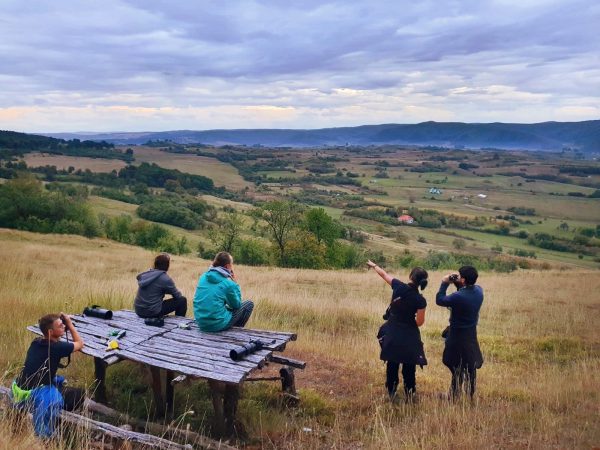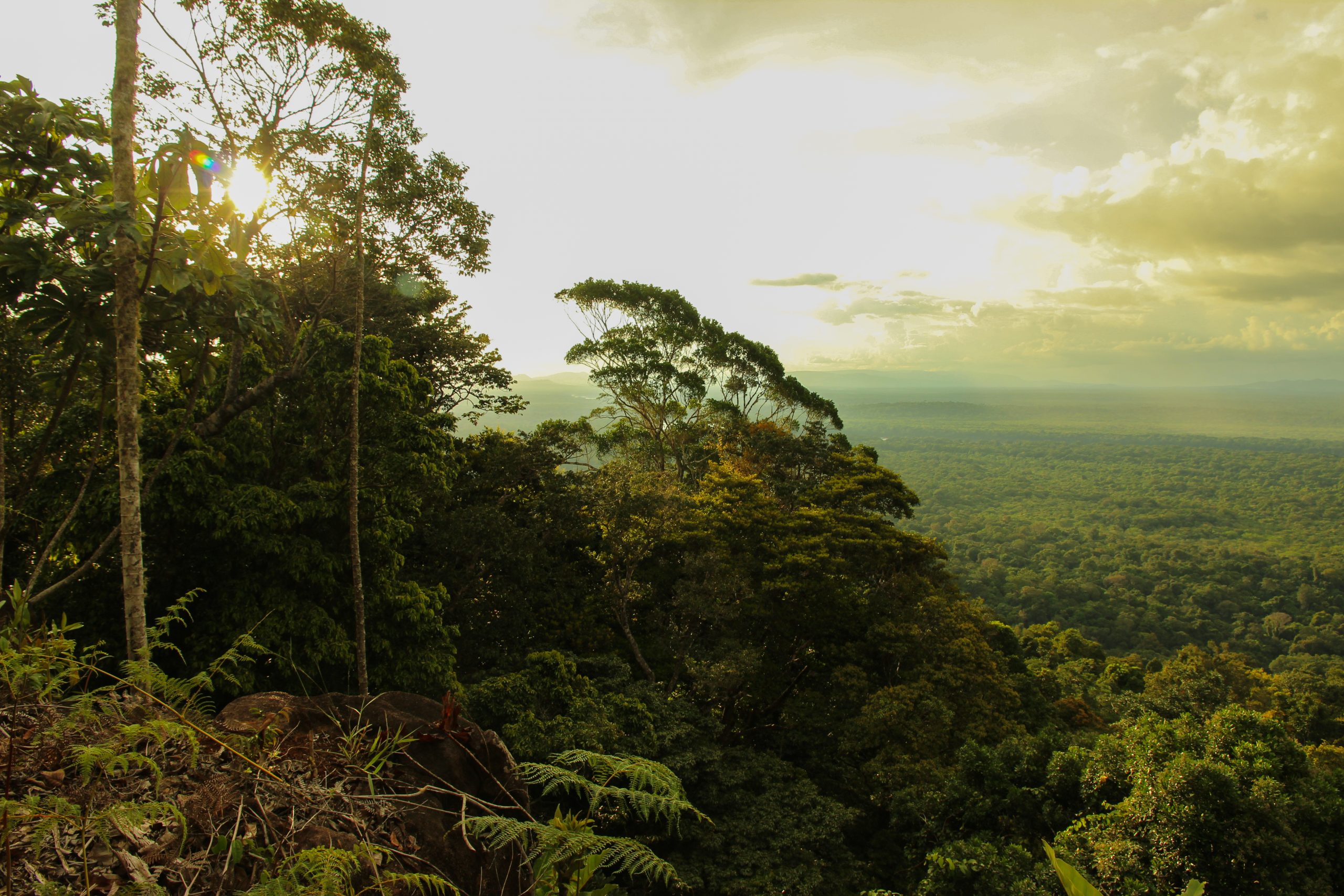

The Save Guyana’s Wildlife program has arisen out of a four-way partnership between Friends of Wallacea (FOW), the Guyana Tourism Authority (GTA), Operation Wallacea (Opwall), and local communities to protect biodiversity while improving livelihoods within the forests of the Guiana Shield and the savannahs of the Rupununi.
1. Sustainable logging: The Iwokrama Rainforest Reserve in the Guiana Shield covers one million acres of lowland rainforest and is home to an indigenous community who lives within the forest. Fairview Village has acted as stewards for the forests where they reside for millennia, sustainably managing resource use to protect wildlife and their vital ecosystems. These forests were given by the Guyanese government to the Commonwealth Secretariat to manage as a demonstration site for a management strategy where more than half of Iwokrama is a Wilderness Preserve, with the rest designated as a Sustainable Utilization Area, where particularly valuable trees are selectively logged at extremely low levels on a 60-year return rate to ensure rehabilitation. Opwall has helped monitor the impact of this scheme on biodiversity in Iwokrama for over ten years.
2. Community-led wildlife tourism: GTA and Opwall worked with anthropologists from University of Western Australia and Tulane University to determine the number of tourist visitor-nights needed to change local perceptions of the relationship between tourism and conservation within specific indigenous villages and the related socio-economic and environmental impacts and benefits. While communities have managed and protected these ecosystems for thousands of years, pressures to develop rural regions of Guyana through resource extraction have mounted in recent decades. Community-led and owned tourism (CLOT) is seen as a potential alternative source of income to ward off these developments.
In 2019, GTA asked Opwall and Friends of Wallacea if they could spread the impact of this income more widely by working with three additional villages in Guyana’s Rupununi and forested regions to develop community-led and owned wildlife tourism offerings. This project will include the development of week-long group travel itineraries to remote indigenous communities and aid in wildlife monitoring in these areas through citizen-science data gathering techniques. FOW will be developing an ethnographic research component alongside anthropologists to monitor how attitudes toward wildlife change over time throughout the program.
GTA and FOW will launch an international marketing campaign in 2021 (COVID restrictions permitting) to attract tourists who want to help local communities and experience and protect the spectacular wildlife of Guyana’s pristine savannah and rainforest ecosystems. After a period of five years, FOW will transfer all ownership of the operations to local communities and/or operators involved, with a commitment to training a local team who can manage this operation independently. While partners may choose to continue working with FOW beyond five years, our goal is to empower these communities to lead and manage operations locally to maximize their economic benefit.
This case demonstrates multiple intersections of public-private-community partnership to empower local communities toward improved ecosystem stewardship within Guyana’s unique rainforest and savannah communities. At its core, the management of the Iwokrama Rainforest Reserve requires the participation of the Guyanese government, the Commonwealth, and local communities. The limited logging scheme works to balance local needs with overarching conservation efforts. To date, there appears to be little significant disturbance of wildlife communities.
The partnership between the GTA (under the Ministry of Tourism, Industry and Commerce), Opwall, Friends of Wallacea, and host communities has demonstrated a firm political will to provide development support to rural communities living within Guyana’s biodiversity hotspots through net positive impact tourism. This investment in developing and marketing community-led wildlife tourism enables existing partners like Opwall to advance efforts to monitor and monetize conservation for communities who otherwise would remain outside of the regular ecotourism circuit. This monetization would also form tourism related jobs in the communities that encourage locals to remain in the communities, showcase the role of nature and wildlife, work with future researchers and travelers to educate them and the wider world, and encourage the Indigenous Peoples to also learn and grow from this experience in their selected fields.
GTA’s commitment to the Save Guyana’s Wildlife program has the potential to bring thousands of hectares of forest under sustainable community management, as well as creating positive economic outcomes for a significant proportion of indigenous community members.
This case demonstrates multiple intersections of public-private-community partnership to empower local communities toward improved ecosystem stewardship within Guyana’s unique rainforest and savannah communities. At its core, the management of the Iwokrama Rainforest Reserve requires the participation of the Guyanese government, the Commonwealth, and local communities. The limited logging scheme works to balance local needs with overarching conservation efforts. To date, there appears to be little significant disturbance of wildlife communities.
The partnership between the GTA (under the Ministry of Tourism, Industry and Commerce), Opwall, Friends of Wallacea, and host communities has demonstrated a firm political will to provide development support to rural communities living within Guyana’s biodiversity hotspots through net positive impact tourism. This investment in developing and marketing community-led wildlife tourism enables existing partners like Opwall to advance efforts to monitor and monetize conservation for communities who otherwise would remain outside of the regular ecotourism circuit. This monetization would also form tourism related jobs in the communities that encourage locals to remain in the communities, showcase the role of nature and wildlife, work with future researchers and travelers to educate them and the wider world, and encourage the Indigenous Peoples to also learn and grow from this experience in their selected fields.
GTA’s commitment to the Save Guyana’s Wildlife program has the potential to bring thousands of hectares of forest under sustainable community management, as well as creating positive economic outcomes for a significant proportion of indigenous community members.
This case demonstrates multiple intersections of public-private-community partnership to empower local communities toward improved ecosystem stewardship within Guyana’s unique rainforest and savannah communities. At its core, the management of the Iwokrama Rainforest Reserve requires the participation of the Guyanese government, the Commonwealth, and local communities. The limited logging scheme works to balance local needs with overarching conservation efforts. To date, there appears to be little significant disturbance of wildlife communities.
The partnership between the GTA (under the Ministry of Tourism, Industry and Commerce), Opwall, Friends of Wallacea, and host communities has demonstrated a firm political will to provide development support to rural communities living within Guyana’s biodiversity hotspots through net positive impact tourism. This investment in developing and marketing community-led wildlife tourism enables existing partners like Opwall to advance efforts to monitor and monetize conservation for communities who otherwise would remain outside of the regular ecotourism circuit. This monetization would also form tourism related jobs in the communities that encourage locals to remain in the communities, showcase the role of nature and wildlife, work with future researchers and travelers to educate them and the wider world, and encourage the Indigenous Peoples to also learn and grow from this experience in their selected fields.
GTA’s commitment to the Save Guyana’s Wildlife program has the potential to bring thousands of hectares of forest under sustainable community management, as well as creating positive economic outcomes for a significant proportion of indigenous community members.
© Linking Tourism & Conservation (LT&C) 2019
We are grateful that you support the work and mission of LT&C! We accept donations through Credit Card, PayPal or international bank transfer:

Donate through Credit Card
Please click the Donate button and then choose your PayPal account
Bank details:
Cultura Sparebank
Pb. 6800, St. Olavs plass
N-0130 Oslo
Name: Linking Tourism & Conservation,
Account no.: 1254 05 95168
IBAN: NO8712540595168
BIC/SWIFT: CULTNOK1
Routing BIC: DNBANOKK
Please mark payments with your name and/or email address
Sign up for an LT&C membership by filling in the details below.
Would you like your LT&C-Example/Initiative to be listed on our website? Please fill in the form below.